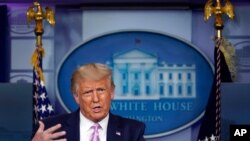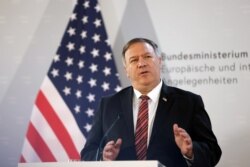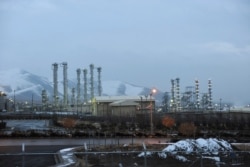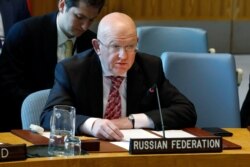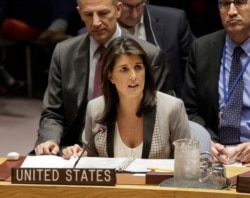President Donald Trump said Wednesday that the United States will seek a “snapback” of all international sanctions on Iran at the United Nations, one week after failing to persuade Security Council members to extend an expiring arms embargo beyond mid-October.
"My administration will not allow this Iran nuclear situation to go on," Trump told reporters at the White House. “Iran will never have a nuclear weapon."
Secretary of State Mike Pompeo will go to New York on Thursday to notify the Security Council, initiating the process known as snapback. He will also meet with U.N. Secretary-General Antonio Guterres.
“Secretary Pompeo’s notification to the Council follows its inexcusable failure last week to extend the arms embargo on the world’s leading state sponsor of terrorism and anti-Semitism,” State Department spokesperson Morgan Ortagus said in a statement, referring to Iran.
Council crisis
That vote failed to garner support among the 15-member Security Council – only the Dominican Republic voted with the U.S. to continue it. Triggering the snapback provision is only likely to highlight that divide.
Other participants in the 2015 Iran nuclear deal – known formally as the Joint Comprehensive Plan of Action (JCPOA) – are against reimposing old sanctions, which would likely lead to the fraying deal’s total collapse.
Under the JCPOA, the five permanent Security Council members (Britain, China, France, Russia and the United States) plus Germany agreed with Iran to gradually lift the sanctions in return for limits on Tehran’s nuclear activities that would prevent it making a nuclear bomb. It also reopened Iran’s markets to many foreign investors.
Trump has repeatedly called the JCPOA “the worst deal ever.”
In May 2018, he withdrew the United States from the deal and reimposed unilateral sanctions. In response, Tehran resumed some of its nuclear activities, and in July 2019 it breached the deal by exceeding limits on both uranium enrichment and stockpile levels.
Diverging views
One of the core issues is whether Washington has the right to trigger the snapback provision when it is no longer part of the JCPOA. Washington says it does, because snapback is part of a Security Council resolution endorsing the nuclear deal.
“Under Resolution 2231, the United States has every right to initiate snapback of provisions of previous Security Council resolutions,” U.S. Ambassador Kelly Craft said after last Friday’s failed arms embargo vote.
But the deal’s other stakeholders disagree.
“The United States, no longer a participant in the Plan after withdrawing from it, has no right to demand that the Security Council invoke the snapback provision,” China’s foreign minister wrote to the Security Council president on June 7. Russia's and Iran’s positions are in line with China’s.
Washington’s allies are also not on board, with the European Union foreign policy chief’s spokesman telling German news agency DPA that because the U.S. has pulled out of the deal and has not participated in any JCPOA-related activities since, it “is not in a position to resort to mechanisms reserved for JCPOA participants.”
“The snapback ploy will be ... ineffective, as even our closest allies and partners won’t go along with it — and for good reason," said Ned Price, who was policy and communications director at the National Security Council during the Barack Obama presidency. “And the Trump administration knows this.”
In a comment to VOA, Price said there is an ulterior motive behind Trump’s action.
“To make it as difficult as possible for a Biden administration to revive the JCPOA. This is a move animated more by spite than it is by any genuine effort to restrict Iran’s nuclear program. If the latter were the goal, rejoining the JCPOA would be the most effective approach,” Price said.
How snapback works
In order to initiate snapback, a JCPOA member would need to notify the Security Council that Iran is in noncompliance. That would start a 30-day clock, during which the council would need to adopt a new resolution keeping the current termination of sanctions in place. But the U.S. would likely veto that, and if at the end of the 30 days there is no new resolution extending the sanctions relief, the old pre-2015 sanctions would automatically snap back.
“We think the reality is going to be pretty different,” said Richard Gowan, U.N. director for the International Crisis Group. He said the Security Council president, currently Ambassador Dian Djani of Indonesia, will quietly canvass other council members on their views on how to move forward.
“We expect that at some point, maybe next week, the president of the council will tell his colleagues that there is no consensus on how to proceed, and most likely, a majority of council members do not believe the U.S. has the right to trigger snapback. And under those circumstances, he cannot reasonably be expected to oversee the process set out in Resolution 2231,” Gowan said.
But that would leave the clock running, and the U.S. could claim at the end of September that U.N. sanctions have been automatically reimposed. But it could be a hollow success, as countries that disagree with Washington may simply ignore the sanctions and not enforce them.
Russia or China might also use Security Council procedural hurdles to delay the snapback process. Another route would be to seek a legal opinion from the International Court of Justice on whether the U.S. can invoke snapback – a decision that could take many months.
“It will be a political matter at the end that will resolve this, not a legal or a procedural matter,” said former U.S. Undersecretary of State Wendy Sherman, one of the negotiators of the nuclear deal.
Looking ahead
The push to extend the arms embargo and reimpose other sanctions is happening in the lead-up to the November 3 U.S. presidential election, adding yet another factor to stakeholders’ calculations.
A second Trump term would inevitably kill the deal, but if his challenger, Joe Biden, wins, he has said the U.S. would rejoin it. This could lead some countries, including Iran, to take a wait-and-see approach before responding.
Supporters of the Trump administration’s maximum pressure campaign on Iran say it is working and that while some allies may not be on board, others are.
“While disappointed as we are about the Europeans and the way they have responded to this, we have another set of allies that we didn’t always have,” Former U.S. Ambassador to the U.N. Nikki Haley told Washington-based United Against Nuclear Iran on Tuesday. “We now have Arab countries who know the threat of Iran, who know what it means. And it’s their region.”
“We strongly support the president for taking this important step to ensure Iran never has a nuclear weapon,” said Matt Brooks, executive director of the Republican Jewish Coalition. “Unlike Joe Biden, who wants to go back to the Iran deal — which gave Iran billions of dollars and a pathway to the bomb — President Trump understands that pressure, rather than coddling, will bring Iran to the table and be the best pathway to meaningful peace.”
Most recently, concern about Iran drew the United Arab Emirates and Israel to normalize relations. Other Gulf states are reportedly ready to follow.




